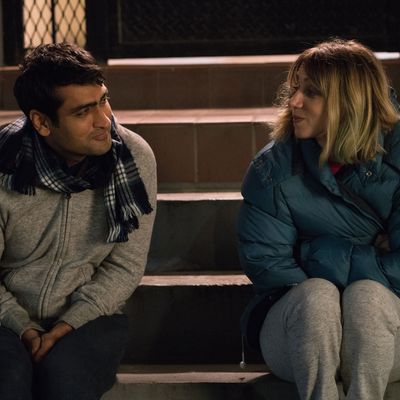
The best thing you can say about The Big Sick is that having Kumail Nanjiani as a romantic lead is maybe the 11th most remarkable thing about it. Say what you will about producer Judd Apatow, but his rambling house style is a universal normalizer; five minutes in, you’ll swear The Big Sick is the 28th Pakistani-American girlfriend-in-a-coma romantic-comedy-drama you’ve seen. Like many long-term relationships, it’s the kind of thing you relax into, certainly not thinking at the outset that you’re in for anything monumental. Maybe you even take for granted all the things that aren’t difficult or frustrating about it, until two years (or two hours) have passed and you look up and realize you’re in love.
Written by Nanjiani and his wife and writing–podcasting–comedy-stuff partner, Emily V. Gordon, The Big Sick tells the actual story of how the two met in Chicago while he was an up-and-coming comedian and she was studying to be a therapist. Nanjiani plays an earlier version of himself, while Zoe Kazan plays Emily. (The story has been updated to the present day; Nanjiani’s character makes ends meet as an Uber driver, which lends itself to a couple of very funny bits early on.) It all starts off as predictably and millennial-ly as one would imagine: inflatable mattresses and awkward roommate encounters and repeated exhortations that the pair “can’t do this.” But Kumail doesn’t tell Emily that his family is actively searching for a Pakistani bride for him, for a traditional arranged marriage, and that for him, dating a white woman is asking to get disowned. Then, as their relationship is crumbling, Emily falls gravely ill, and her parents arrive in Chicago to be by her side — and, in an unexpected but organic turn, so do Kumail’s.
It’s possible that the sudden sidelining of Emily would feel cheap without the knowledge that it actually happened. But what makes the turn feel both real and terribly inconvenient is the strong impression Kazan makes in the film’s first act. Here’s an example of what a female perspective both in front of and behind the camera can do for a character who could have easily been a romantic object to be projected on to. She’s imperfect, but the film doesn’t try to make a point of her imperfection, and she’s capable of breaking a heart without being a bitch. By the time Emily goes into a medically induced coma, we palpably miss her, because she feels like a real person, with a million little things going on that have been put on indefinite hold.
In her stead arrive Ray Romano and Holly Hunter as her parents Terry and Beth, wracked with worry, bickering with each other, still mad at Kumail on Emily’s behalf, and both instantly lovable. The looming Romano and diminutive, sharp-edged Hunter are such a delightful study in contrasts you wonder why they’ve never been cast opposite each other before. And it’s through them that The Big Sick becomes a story rarely explored or romanticized on film, about what it’s like to bond with the parents of the person you’re in love with. Terry and Beth are suspicious of Kumail at first, but as they keep vigil over Emily — three nervous wrecks, tightly wound in their own ways — they slowly unravel for each other. A scene in which Beth attempts to defend Kumail from a racist heckler is both hilarious and deeply endearing.
Michael Showalter, whose recent streak as a director of emotionally rich comedy (2015’s Hello, My Name Is Doris; the superb and surprisingly human TBS series Search Party) nails the perfect balance of character and, yes, actual jokes — nobody’s more absurd than a real human would be, but more often than not that’s plenty absurd. His sensibility resonates well with Nanjiani’s, who is perfectly comfortable with the idea that not everything needs a joke. There’s none of the desperation that makes similarly sourced “comedian films” so exhausting.
As Kumail’s relationship with Emily’s parents deepens, he risks permanently damaging his relationship with his own family, who, while not receiving quite the rich material Hunter and Romano get, are a joy. Zenobia Shroff is particularly great as Kumail’s mother, whose coquettish head-tilts as she feigns surprise at the arrival of another prospective bride are diamond-sharp. If there’s any element the film could do without, it’s the business around Kumail’s stand-up career, which is amusing enough but well-worn territory — the greenroom banter with his friends (played by Aidy Bryant, Kurt Braunohler, and Bo Burnham) feels obligatory, and more recognizably Apatovian than the rest of the film.
But the comedy arc is indispensable for the film’s feel-good final chapter, and besides, everyone’s just so lovable, why would you want less of them? The film’s real-life origins are likely key to the film’s protracted and sometimes unfocused denouement, but it’s hard to imagine something tidier being more satisfying. And even if you are already aware that things end up fine (spoiler alert: Nanjiani and Gordon are married) there’s still plenty of reason to keep watching. That’s the thing: Even if The Big Sick risks being too long, or too gently lovable, it’s certainly welcome counterprogramming for a clobbering summer.

